There are conferences, and there is TED. A trip to TED comes with a high price tag and high expectations for a mind-blowing, life-changing experience – no small pressure on the organizers. I was elated to attend the TEDWomen conference in Washington, DC this week, and it did not disappoint.
I find it interesting that there was a heated debate within the TED organization whether or not to have this conference. Yes, women attend the other TED conferences as well. We can agree that “women’s” issues – equality, poverty, hunger, education, children and women’s health – are everyone’s issues. TED has had conferences focused on Africa and India – surely a conference focused on 50% of the world population has the appeal and impact to justify its existence.
The conference planners – Pat Mitchell, current President and CEO of the Paley Center for Media and former President and CEO of Public Broadcasting Service and June Cohen, Executive Producer of TED Media, certainly gave this effort their all. They packed 70 speakers into the two-day conference, as many speakers as are usually at the four-day TED conferences. The number is slightly misleading, as this conference had several team presenters, but they really did pack in the speaker sessions, with full session over dinner one night as well.
I managed to snap out of my awe enough to take a few pictures to share. I’ll run through those before jumping into my analysis of the conference.
The conference opened with a brief introduction by TED curator and guru, Chris Anderson.
Then the power team of Pat Mitchell and June Cohen took over.
Financier Halla Tomasdottir of Iceland gave a fantastic talk about how feminine values in finance might have saved Iceland from its dramatic financial collapse. It was easily one of the highlights of the first day and was the first talk from TEDWomen to be posted online. You can watch it here: Halla Tomasdottir at ted.com.
National Geographic explorers Beverly and Dereck Joubert talked about their work documenting the big cats in Africa and the devastating impact the extinction of these animals would have on the ecology and economy of the continent. They are soon releasing a documentary on this issue called “The Last Lion,” which is certain to have incredible visuals. During their talk they showed footage of an elephant being attacked by lions that was terrifying, ultimately triumphant and altogether unforgettable.
Hillary Clinton’s surprise visit was bookended with thunderous standing ovations. The issue of female empowerment, she said, is not just about equality and fairness – it’s “a security issue, a prosperity issue, a peace issue.” Agree with her or not, she is extremely impressive.
It’s a testament to the value of TED that presenters usually also attend the conference. Donna Karan, not scheduled to speak until the end of the conference, was there to take it in with everyone else. Here she is, beautiful and iconic, with a chic patent leather cast over her broken arm.
Rufus Griscom and Alisa Volkman, founders of parenting site Babble.com and formerly of sex and dating site Nerve.com, gave an amusing and charming talk about the taboos topics of parenthood. Their message is much like ours here at chinesegrandma – truth in life, truth in parenting – though they made quite a glossy pair, Alisa looking petite and lovely despite giving birth to their youngest of three sons just eight weeks ago.
We had our choice of Food Network luminaries to watch as we ate our box lunches: Paula Deen, Alton Brown or Rachel Ray. I heard that Paula Deen gave a fantastic talk about her life story, including the fact that she did not start on her path to food stardom until age 42. I wish I’d seen it. I saw Alton Brown, who looks like he should be on Frasier. Everyone tried hard not to splatter salad dressing on their laps.
Some of the talks were in fact interviews conducted by Pat Mitchell. Madeleine Albright was smart, insightful and very funny. She stated that societies are better off when women are economically and politically empowered. But when asked whether things would be better if women were in charge, she dismissed the generalization with a smile: “If you think that, then you’ve forgotten high school.”
She acknowledged the complexity of women’s lives (“I think guilt is every woman’s middle name”) but also their strengths in diplomacy, personal relationships and broader humanitarian concerns for health and education.
Caroline Casey, a legally blind activist from Ireland, gave an impassioned talk about accepting ourselves for who we are. She did not know she was visually impaired until age 17 – her parents, inspired by Johnny Cash’s song “A Boy Named Sue” (written by the brilliant Shel Silverstein, by the way) – had decided not to tell her, believing she was smart enough to get along normally even with the disability. She spent another 10 years trying to hide her impairment before finally embracing it and starting Kanchi, an organization dedicated to changing society’s perception of disability. “Being absolutely, truly yourself is freedom.” She also urged the audience not to inflict labels on themselves or others, “because we are not jam jars.” She was a force to behold.
The conference closed out with TED veteran speaker Eve Ensler, playwright and anti-violence activist. She gave a thoughtful, personal talk about how it took cancer for her finally to connect with her body, and the parallels to our collective disconnect with our global environment. She is a powerful voice, as any of you who have seen her past talk, Eve Ensler on Embracing Your Inner Girl at Ted.com, already knows.
The final dinner was held at a new building for the Institute of Peace, designed by Israeli architect and former TED presenter Moshe Safdie. The building is so new isn’t even occupied yet. It is a stunning space.
And this video installation added a gorgeous backdrop to our final evening together.
Messages from TEDWomen
Change is coming – It’s not quite the “end of men” yet, as Hanna Rosin discussed in her talk based on her Atlantic Monthly article of that name. But in the US women are dominating education at all levels, and around the world structural change is slowly happening with the determined efforts of humanitarians who are changing women’s lives one by one and demonstrating to those communities a different way of looking at the value of girls.
When girls win, everyone wins – Empowering women and girls brings stability and economic progress that lasts not just for those individuals but for future generations. As several speakers stated, this is not a zero sum game in which girls progress at the cost of boys. Sally Osberg of the Skoll Foundation pointed out that an educated girl in Africa earns 25% more, her children are 40% more likely to live past age 5, and she’s three times less likely to become HIV positive. Enlightenment on gender roles is freeing for men as well, as Tony Porter illustrated so movingly in his talk: Tony Porter on Breaking out of the Man Box at Ted.com.
Individuals make a difference – Every presenter was a superwoman, but some of them stand out. Kiran Bedi, India’s top cop, blew me away with her toughness and compassion, changing prisoners’ lives through education and meditation (watch her talk here). Mother-daughter doctors Hawa Abdi Dhiblawe and Deqo Mohamed were superhuman, tending to 600 patients daily, schooling 800 children and maintaining order and civility in their Somali refugee camp of 90,000. As Nobel Peace Prize winner Jody Williams said, peace is not something that just happens – it comes from individuals, working hard every day.
Women need to support one another – Madeleine Albright’s statement – “There’s a special place in hell for women who don’t help each other” – was the standout quote of the conference. As Sheryl Sandberg, currently of Facebook and formerly of Google, also pointed out, women aren’t always supportive of one another. As with men vs women, women vs women is not a zero sum game. Women all gain when other women do well.
Women need to believe in themselves – This was a major theme in Sheryl Sandberg’s talk: that women are prone to underestimating themselves, while men are prone to overconfidence. Even the formidable Madeleine Albright admitted to having “reluctant female” moments. As Sheryl Sandberg urged, women need to “sit at the table,” not hang on the sidelines and wait for an invitation.
Women should embrace their femaleness – Halla Tomasdottir was an immediate hero to many with her straightforward confidence and unapologetically female values. Madeleine Albright said “I love being a woman.” One of my favorite TEDWomen moments was when a presenter – I think it was Kiran Bedi? – told the story of a time she was asked if she had been able to do less in her life because she was a woman. “No,” she replied. “I’ve been able to do more.” A proud and true statement by a master multitasker.
Women are more in touch with the world – Women’s intuition is not just a touchy-feely concept – it’s a keen awareness of our broader environment. It’s Kate Orff and her fantastic organic architecture (“oystertecture”), bringing the forces of nature to bear on manmade problems of overdevelopment and pollution. It’s Penelope Jagessar Chaffer and her upcoming film, “Toxic Baby,” talking about the chemicals we can’t escape and their devastating impact on our children and generations to come. It’s Elizabeth Linsey and her mesmerizing story of the lost wisdom of Polynesian navigators. More than one presenter, including Sia Nyama Koroma, first lady of Sierra Leone, pointed out that women in charge would be less quick to war, knowing more keenly the impact on women and children. Women are in touch with their bodies, their children, their surroundings, and that intuition is a real strength. (By the way, demonstrating multitasking, Kate Orff was the first visibly pregnant TED presenter, and Penelope Jagessar Chaffer was a quick second and only one week away from her due date.)
What TED does brilliantly
Global view – Attendees came from 90 countries, and speakers were also from around the world. There were also many TEDx events around the world – independently organized gatherings to watch the conference and listen to speakers of their own – which the TEDWomen presenters would periodically connect to, Dick Clark style, via live video streaming. A global perspective is clearly a core value at TED, and the opportunity to hear those international voices both onstage and from other attendees is one of TED’s unique attractions.
Ideas – Ideas are the heart of TED. We had some amazing ones. Deborah Rhodes with her revolutionary, life-saving technology for breast cancer screening, molecular breast imaging (Deborah, have you considered “gammagram”?). Fiona Eberts of Camfed.org, introducing the super-nutritious moringa tree and its potential for alleviating hunger in Africa. Cynthia Breazeal of MIT, with the future of robots in communication, collaboration and play.
People – Those that aren’t specifically invited to TED have to apply. As one of my new friends noted, applying to TED is like applying to college (minus the transcript). The application process is time consuming for both attendees and conference planners, but it pays off in ensuring that everyone who comes is driven there by some kind of passion.
Density – The TED organizers know how to pack it in, and there’s never a dull moment. Attendees are prepped to use every minute of the opportunity, and as a result people strike up conversation even waiting in the bathroom line. Well placed surprises, such as Hillary Clinton’s appearance, add to the already high level of excitement.
Organization – This is a very well run event. Electronic communication before the event is excellent, with access to information on the program, speakers and other attendees available online. Logistics during the event are fairly straightforward, as unlike other conferences all attendees follow the same program. With tighter control than the Academy Awards, talks run on time and things move on schedule. Presenters have a giant clock at their feet to make sure they don’t overstay their welcome.
Aesthetics – The stage lighting and setting – designed in conjunction with Donna Karan’s Urban Zen organization – were gorgeous, and as Pat Mitchell observed wryly, it’s not easy to transform a government building into a beautiful space. The program and brief video introductions of the speakers were well designed.
Art and music – Interludes for live performances are also unique to TED conferences, and the organizers do a wonderful job selecting and incorporating them into the program. The inventive and beautiful sisters of the Ahn Trio, the soulful duo of Toshi Reagon and her mother Bernice Johnson Reagon, the hoarse but still wonderful Morley. The wise and wonderful cartoons that punctuated New Yorker cartoonist Liza Donnelly’s thoughtful talk. And the unforgettable poet/performer Iyeoka Ivie Okoawo – hard to believe she used to be a pharmacist, which is a good reminder that we never know the hidden talents that reside within people.
Opportunities for improvement
I don’t know if this will be a repeat event. Women’s issues may be everyone’s issues, but the TED men didn’t exactly vote with their time and dollars – attendance was overwhelmingly female, and 80% were first time TEDsters. The good news is that scores of TED admirers like me had the opportunity to experience TED and join forces in a powerful and positive way. The female dominated environment was a welcome change for many. As Speaker of the House, Nancy Pelosi, said to the few men as she observed the room, “When the revolution comes, we will protect you.”
Suggestions for improvement, if there is another TEDWomen in the future:
More ideas – I love the idea of focusing on women’s issues. But I came to TED expecting more mental expansion. The emotional and spiritual impact of TEDWomen was enormous; the intellectual impact was less than I expected. Some veteran TEDsters I met also said that while they enjoyed the conference, it didn’t have the same level of idea innovation as other TED conferences.
Less of the female perspective – Don’t get me wrong, I love to hear about the female perspective. But I also feel like I missed an opportunity to hear Sheryl Sandberg talk about her view of the world from Facebook, one of the most interesting companies of the moment. Instead we heard her standard speech to women in technology – which though interesting wasn’t really what I came to TED to hear. And Nancy Pelosi, instead of talking about the real and pressing issues, such as the impact of the midterm elections, spoke in very general terms about being the first female Speaker of the House. It was great to see these impressively accomplished women at the conference, but I wish they had treated the audience as thought leaders, not just women.
More speaker diversity – I would have loved to hear from some women entrepreneurs in addition to the social entrepreneurs. Or more women on the cutting edge in science, or technology, or healthcare. There is so much happening in education, a field important to many women and one that has been sorely lacking in innovation for too long – I would have loved to hear from some of the people working to bring technology into education.
Half the Sky – It would have been fitting to have Nicholas Kristof and Sheryl WuDunn speak at the TEDWomen conference, as they literally wrote the book on the impact of educating and empowering girls and inspired many to the movement. Unfortunately for us, Sheryl WuDunn spoke at TEDGlobal earlier in the year already, but on a positive note I’m sure at TEDGlobal she was able to reach many more people that had never heard of Half the Sky.
Overall I couldn’t be happier with my first experience at TED. I was spellbound by every presenter, and I only wish I had a chance to meet all the attendees, as every one I met was incredible. TED is not an easy place to get to, and every person there has demonstrated an ability to act, an ability to reflect, a belief in themselves and a desire to be inspired. It was overwhelming to be in a room with that many fantastic women (and a few equally fantastic men), all of whom were open and enthusiastic to share their stories and listen to others. It was a magical time and place, and I am profoundly grateful to have been there to experience it.
For any of my regular readers that made it to the end of this endless post, TED will continue to make appearances here in my brain food posts, but you can always discover some yourself at Ted.com. Tell me if you make a great discovery.
For any of my fellow TEDWomen attendees – if I can help anyone with blogging or anything else I might know about, feel free to contact me. Or just say hi – I’d love to hear from you.

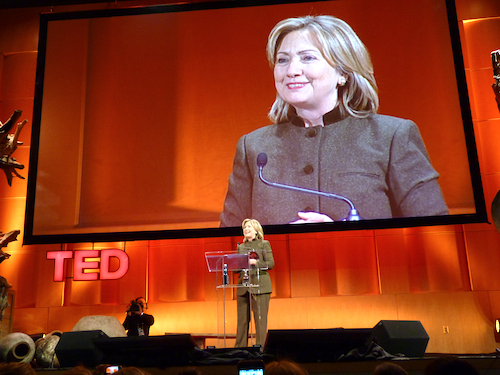
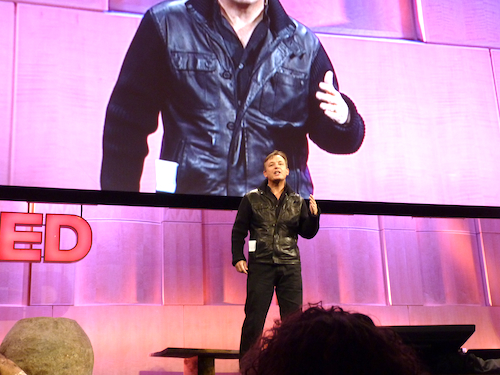
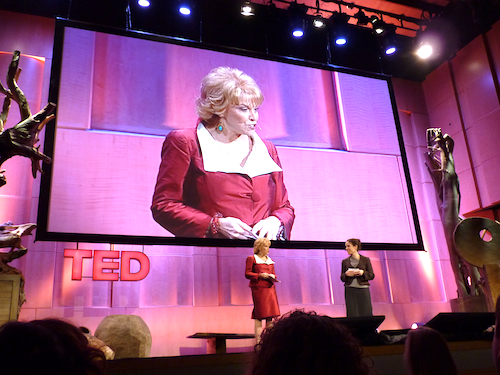
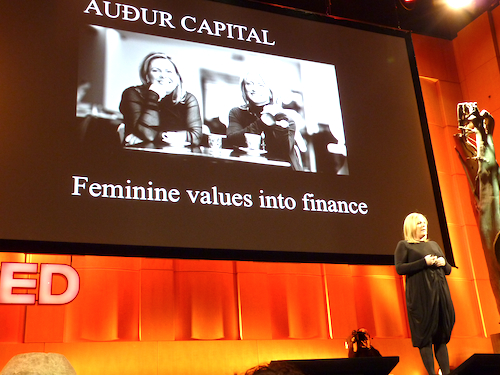
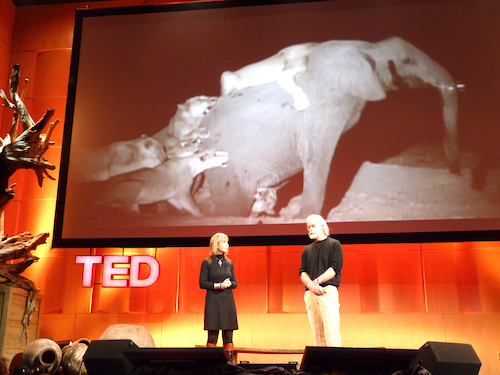
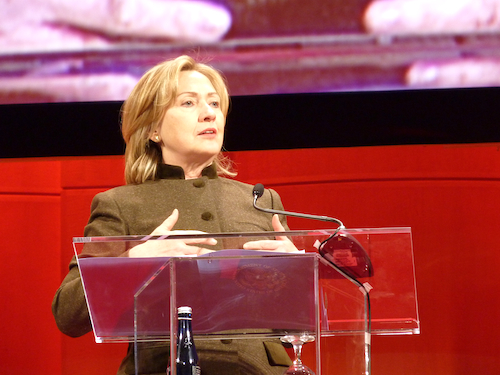
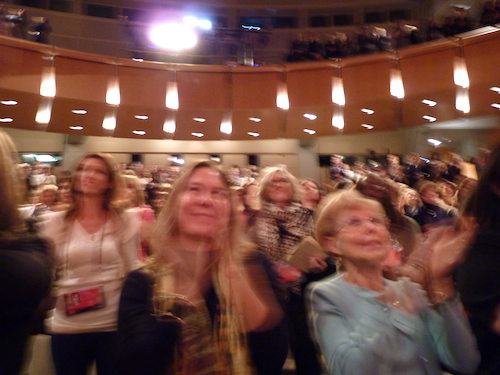
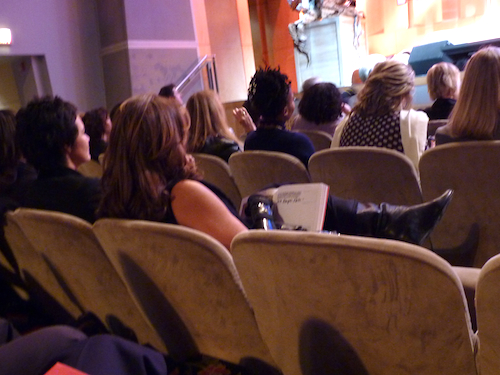
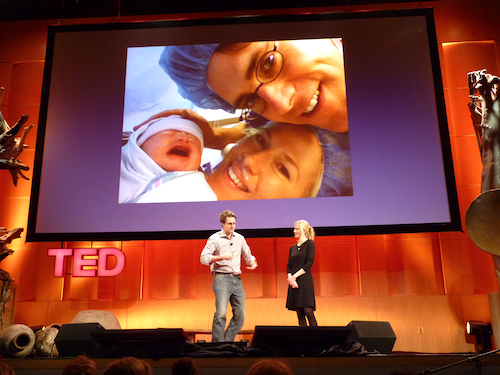
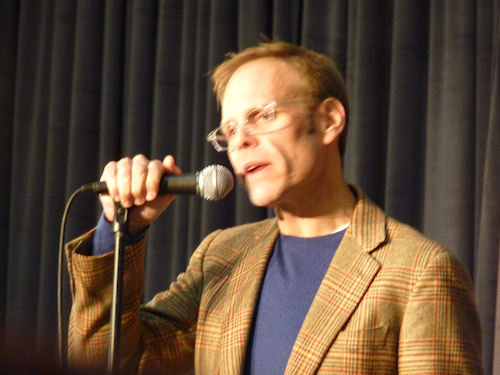
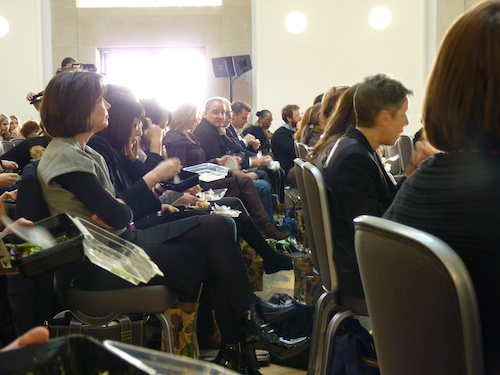
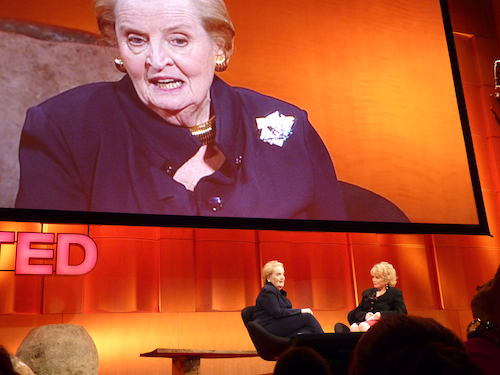
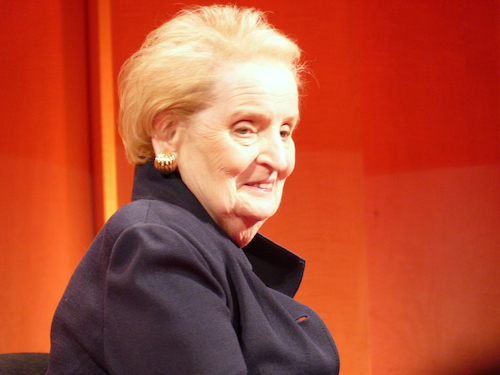
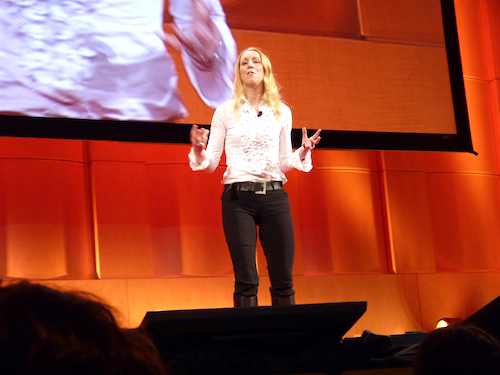
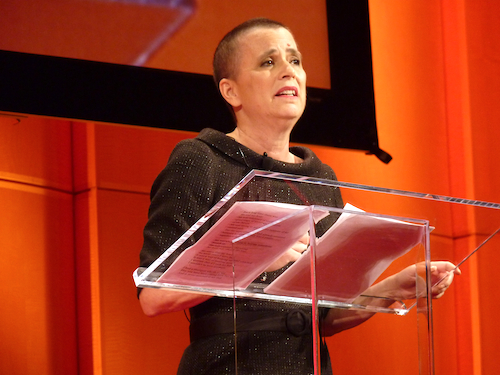
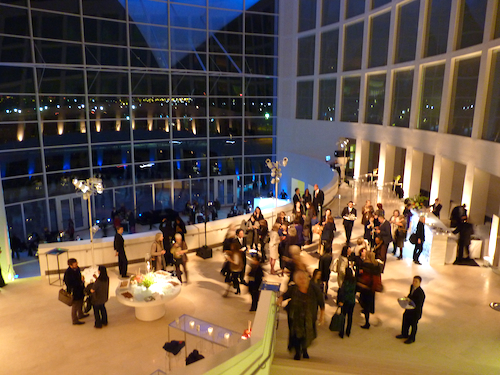
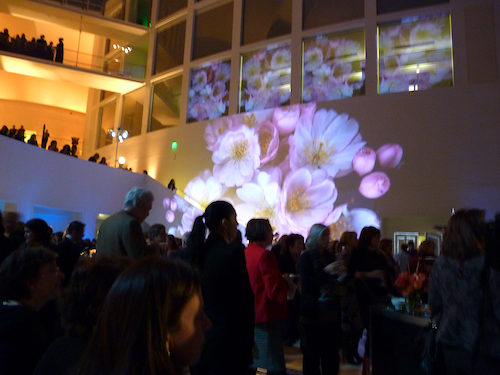


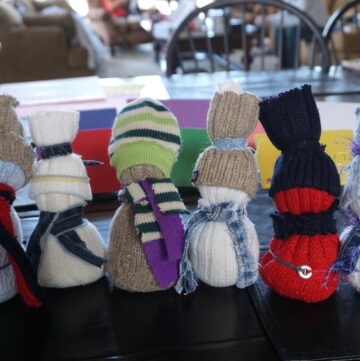

Way to go, CG! Congrats on the conference!
Sounds fantastic! Wish I could have been there…
CG, thank you for sharing your TEDWomen experience with those who couldn’t attend and thank you so much for your shout out! Being hugely pregnant, my experience of TED was slightly surreal to say the least but it was an astonishing and wonderful time of connecting in a very special way.
I also wanted to point out that the TED organizers did not specify to the speakers that their talks be female centric. In fact we were encouraged to talk about how our ideas affect/inform/awaken society in general. Also June Cohen the executive producer of TED, told me that many speakers actually rewrote their talks after hearing some of the other speakers rehearse which I thought was interesting and some speakers like Hans Rosling (the washing machine man) who is a legendary TED talker, did a brand new speech which incorporated his grandmother and mother’s experience.
So a huge salute to you for being one of the best bloggers sharing your thoughts in such a wonderful, inspiring and thoughtful way. And to all of your readers: this is the best precis of the conference I have seen online yet.
I wished I had met you there!
All the best
Penelope
Filmmaker/Toxic Baby
http://www.toxicbaby.com
penelope – you rock for taking the time to read and to share your insight from the presenter’s perspective! as if you don’t have enough going on. =P i am excited to see the film and spread the word about your work. also a shout out to tyrone hayes at UCB, i realize i left out his excellent and accessible contribution from the biologist’s perspective. thanks to both of you for raising awareness of the insidious effect of chemicals on our children and future. sending you best wishes for a smooth and safe birth.
Great write-up! I enjoy watching TED videos when I can.
I’m curious: How much of an opportunity was there to interact with other attendees? Do they allow Q&A with the speakers? (I’m guessing not)
It seems like TED conferences are built for pushing ideas out there, but it’s not really a venue for dialogue, questions, and exchanges amongst the people there.
hi jason! exchanging ideas is really a fundamental value of TED – the conference is really built around bringing people and ideas from different disciplines together to spark innovation. so everyone hears all the talks in quick succession, with conversation breaks in between sessions. there isn’t q&a in the traditional sense, but most of the TED speakers attend the conference, so there is often the opportunity to seek out a presenter to ask questions one on one. the conference organizers also encouraged attendees to send questions and comments to a TED email address for forwarding to the speakers. among attendees there is constant and lively conversation morning until night (at least at TEDWomen – it was only two days and everyone was focused on making the most of every minute – not sure if four-day TED conferences are the same).